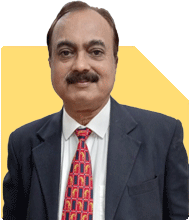Inherited FD - Ladder vs Coop Bank Shares? I'm 24, No Immediate Use & Low Risk Tolerance
Ramalingam Kalirajan |9823 Answers |Ask -Follow
Mutual Funds, Financial Planning Expert - Answered on Jul 22, 2024
He has an MBA in finance from the University of Madras and is a certified financial planner.
He is the director and chief financial planner at Holistic Investment, a Chennai-based firm that offers financial planning and wealth management advice.... more

Subject: Inheritance Received - Investment Strategy Advice I recently inherited a fixed deposit (FD) from my deceased father, and I'm named as the nominee. As I don't currently require immediate access to this money, I'm seeking your advice on the best way to invest it for long-term growth. I'm considering two options: * FD Ladder: Invest the amount in a ladder of FDs with varying maturities to balance potential returns and liquidity. * Cooperative Bank Shares: Explore investing in cooperative bank shares, which might offer higher interest rates than traditional FDs. However, I'm unsure if cooperative bank shares are the right fit for my risk tolerance. Here are my questions: * FD Ladder vs. Cooperative Bank Shares: Given my long-term investment horizon and low liquidity needs, which approach would you recommend? * Alternative Investment Options: Are there other investment avenues I should consider besides FDs and cooperative bank shares that might better align with my goals? I appreciate your guidance in creating a sound investment strategy for these inherited funds.
You have inherited a fixed deposit (FD) and are considering an FD ladder and cooperative bank shares. Let’s analyze these options and explore alternatives for long-term growth.
FD Ladder
An FD ladder involves splitting your FD into multiple smaller FDs with different maturity dates. This strategy balances potential returns and liquidity. It is a low-risk approach, offering guaranteed returns. However, returns might be lower compared to other investment options.
Cooperative Bank Shares
Cooperative bank shares can offer higher interest rates than traditional FDs. However, they come with higher risk. Cooperative banks may not have the same level of regulatory oversight as commercial banks. Assess your risk tolerance carefully before investing in cooperative bank shares.
FD Ladder vs. Cooperative Bank Shares
FD Ladder:
Pros: Low risk, guaranteed returns, better liquidity
Cons: Lower returns compared to riskier investments
Cooperative Bank Shares:
Pros: Higher potential returns
Cons: Higher risk, less regulatory oversight
Given your long-term investment horizon and low liquidity needs, an FD ladder provides stability and guaranteed returns. However, for higher growth, consider diversifying into other investment avenues.
Alternative Investment Options
Equity Mutual Funds
Equity mutual funds offer higher returns over the long term. They invest in a diversified portfolio of stocks. These funds can provide returns of 10-15% annually. Consider allocating a portion of your funds to equity mutual funds for growth.
Balanced Funds
Balanced funds invest in both equity and debt. They offer a mix of growth and stability. These funds can provide moderate returns with controlled risk. Consider investing in balanced funds for a balanced approach.
Debt Funds
Debt funds invest in fixed-income securities. They offer stable returns with lower risk. These funds can provide returns of 6-8% annually. Allocate a portion of your funds to debt funds for stability.
Public Provident Fund (PPF)
PPF offers tax-free returns with low risk. The current interest rate is around 7-8%. It is a long-term investment with a lock-in period of 15 years. Consider investing in PPF for stable and tax-efficient returns.
Systematic Investment Plan (SIP)
Start a SIP for consistent investments in mutual funds. SIPs help in averaging out market volatility. They ensure disciplined investing and long-term growth.
Review and Rebalance
Review your portfolio every six months. Rebalance your investments to align with your goals. Adjust your allocations based on market conditions and performance.
Final Insights
For long-term growth, diversify your investments. An FD ladder provides stability and guaranteed returns. Consider equity and balanced funds for higher returns. Debt funds and PPF offer stability and tax benefits. Regularly review and rebalance your portfolio. Work with a Certified Financial Planner (CFP) for professional guidance.
Best Regards,
K. Ramalingam, MBA, CFP,
Chief Financial Planner,
www.holisticinvestment.in
You may like to see similar questions and answers below
Ramalingam Kalirajan |9823 Answers |Ask -Follow
Mutual Funds, Financial Planning Expert - Answered on Apr 18, 2024
Sanjeev Govila | Answer |Ask -Follow
Financial Planner - Answered on Sep 20, 2023
Kirtan A Shah | Answer |Ask -Follow
MF Expert, Financial Planner - Answered on Aug 30, 2023
Samraat Jadhav |2389 Answers |Ask -Follow
Stock Market Expert - Answered on Mar 14, 2024
Milind Vadjikar | Answer |Ask -Follow
Insurance, Stocks, MF, PF Expert - Answered on Sep 11, 2024
Nayagam P P |9268 Answers |Ask -Follow
Career Counsellor - Answered on Jul 22, 2025
Nayagam P P |9268 Answers |Ask -Follow
Career Counsellor - Answered on Jul 22, 2025
Pradeep Pramanik |241 Answers |Ask -Follow
Career And Placement Consultant - Answered on Jul 22, 2025
Pradeep Pramanik |241 Answers |Ask -Follow
Career And Placement Consultant - Answered on Jul 22, 2025
Pradeep Pramanik |241 Answers |Ask -Follow
Career And Placement Consultant - Answered on Jul 22, 2025
Pradeep Pramanik |241 Answers |Ask -Follow
Career And Placement Consultant - Answered on Jul 22, 2025
Pradeep Pramanik |241 Answers |Ask -Follow
Career And Placement Consultant - Answered on Jul 22, 2025
Pradeep Pramanik |241 Answers |Ask -Follow
Career And Placement Consultant - Answered on Jul 22, 2025
Pradeep Pramanik |241 Answers |Ask -Follow
Career And Placement Consultant - Answered on Jul 22, 2025
Pradeep Pramanik |241 Answers |Ask -Follow
Career And Placement Consultant - Answered on Jul 22, 2025






















